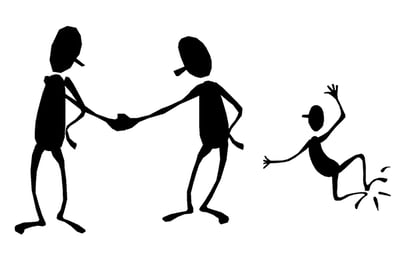
In a recent discussion I had with an InsideOut Dad® facilitator, he made a point that many dads complain – sometimes bitterly – about the mother of their children. This is not the first time I have heard of that issue. It is often called “Mom Bashing,” and some facilitators claim they “lose” the first few sessions of the program because the dads resent the class and are angry about their circumstances. When this happens, emotions can run amuck.
What to do about it?
If you facilitate 24/7 Dad® or InsideOut Dad®, patience is the key. As dads attend the sessions, they will learn what is at the core of their anger and bitterness, and how to better handle those feelings and emotions. They will also learn to be more empathic with the mom (and their child), and how to better communicate within those relationships.
But getting them to that point can still be a challenge. So, I want to point out a few tools right at your fingertips to help you navigate those issues.
First, in your Facilitator’s Manual (for both 24/7 Dad® & InsideOut Dad®) there is a Program Guide that we strongly suggest you read – not once – but a few times. It gives you – the facilitator – insight into the foundation of each program and helps you understand its philosophy, values, and principles. There are also tips on how to handle group conflicts, how to deal with participants who are resistant to change, techniques for facilitating, and more!
Second, the InsideOut Dad® and 24/7 Dad® programs have an Optional Introductory Session found on the flash drive that comes with the program kits. This optional session provides great tips to address the dads’ anger, and also prepare the dads for the journey they are about to embark on.
One example of how the Optional Introductory Session can help is with an activity where the facilitator and dads come together and create an agreement of “Do’s and Don’ts”. I like to call it a “Team Agreement”. This is where facilitators set rules upfront like: “Don’t mom bash”, “Don’t interrupt”, “Do respect each other”, etc. This can be posted in the room as a reminder, and even added to as other things come up. You would be surprised how the dads ‘self-police’, reminding each other when someone breaks the team agreement. This helps the facilitator stay on track. After all, the dads agreed on these rules upfront!
The third tool is one I learned in my previous career as a corporate trainer in customer service. Because staff got defensive with complaining customers, management created a visual aid to help coach staff to handle those situations more effectively. This visual had the customer and their complaint on one side and the staff person on the other. Here, the staff person saw the customer as the challenge, but we encouraged the staff person and the customer to join sides and address the problem together. A win-win.
Allow me to apply the same principle to the father-mother relationship. In the figures you see a mom and a dad on opposite sides each struggling, frustrated, and angry at each other. In the middle is the child.

The idea is to have the mom and dad on the same side, or on the same page, working together to co-parent and raise their child. Not fighting with each other, but fighting FOR each other and for the best outcomes for their child. A win-win-win!

I hope these tools help in reducing dads’ initial resistance to your classes so they can absorb the lessons of the programs sooner. Feel free to share how you have overcome some of these challenges – I would love to hear from you!
For more information please check out some of our free supportive resources for programs such as InsideOut Dad® and 24/7 Dad® in NFI’s Free Learning Center, as well as our resources for moms. And, check out our ever-growing list of courses in the Father Engagement Academy™ including a course on Effective Facilitation Skills.
